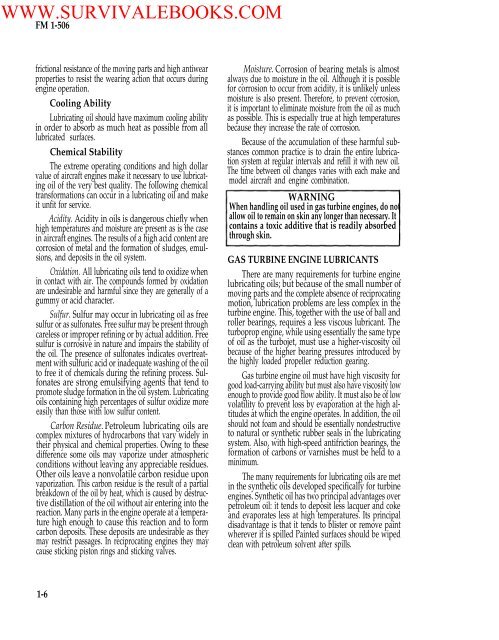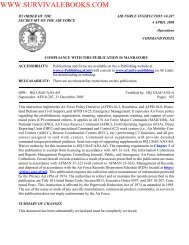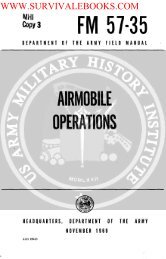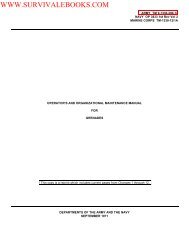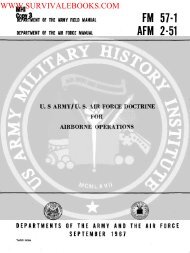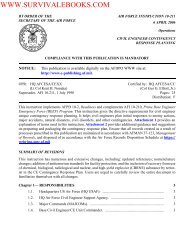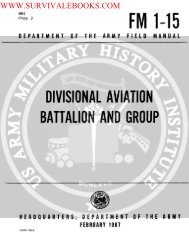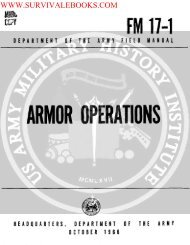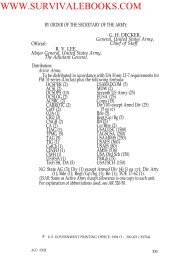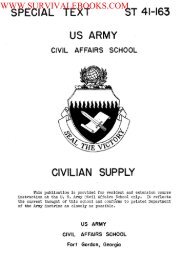FM 1-506 Fundamentals of Aircraft Power Plants ... - Survival Books
FM 1-506 Fundamentals of Aircraft Power Plants ... - Survival Books
FM 1-506 Fundamentals of Aircraft Power Plants ... - Survival Books
Create successful ePaper yourself
Turn your PDF publications into a flip-book with our unique Google optimized e-Paper software.
WWW.SURVIVALEBOOKS.COM<strong>FM</strong> 1-<strong>506</strong>frictional resistance <strong>of</strong> the moving parts and high antiwearproperties to resist the wearing action that occurs duringengine operation.Cooling AbilityLubricating oil should have maximum cooling abilityin order to absorb as much heat as possible from alllubricated surfaces.Chemical StabilityThe extreme operating conditions and high dollarvalue <strong>of</strong> aircraft engines make it necessary to use lubricatingoil <strong>of</strong> the very best quality. The following chemicaltransformations can occur in a lubricating oil and makeit unfit for service.Acidity. Acidity in oils is dangerous chiefly whenhigh temperatures and moisture are present as is the casein aircraft engines. The results <strong>of</strong> a high acid content arecorrosion <strong>of</strong> metal and the formation <strong>of</strong> sludges, emulsions,and deposits in the oil system.Oxidation. All lubricating oils tend to oxidize whenin contact with air. The compounds formed by oxidationare undesirable and harmful since they are generally <strong>of</strong> agummy or acid character.Sulfur. Sulfur may occur in lubricating oil as freesulfur or as sulfonates. Free sulfur may be present throughcareless or improper refining or by actual addition. Freesulfur is corrosive in nature and impairs the stability <strong>of</strong>the oil. The presence <strong>of</strong> sulfonates indicates overtreatmentwith sulfuric acid or inadequate washing <strong>of</strong> the oilto free it <strong>of</strong> chemicals during the refining process. Sulfonatesare strong emulsifying agents that tend topromote sludge formation in the oil system. Lubricatingoils containing high percentages <strong>of</strong> sulfur oxidize moreeasily than those with low sulfur content.Carbon Residue. Petroleum lubricating oils arecomplex mixtures <strong>of</strong> hydrocarbons that vary widely intheir physical and chemical properties. Owing to thesedifference some oils may vaporize under atmosphericconditions without leaving any appreciable residues.Other oils leave a nonvolatile carbon residue uponvaporization. This carbon residue is the result <strong>of</strong> a partialbreakdown <strong>of</strong> the oil by heat, which is caused by destructivedistillation <strong>of</strong> the oil without air entering into thereaction. Many parts in the engine operate at a temperaturehigh enough to cause this reaction and to formcarbon deposits. These deposits are undesirable as theymay restrict passages. In reciprocating engines they maycause sticking piston rings and sticking valves.Moisture. Corrosion <strong>of</strong> bearing metals is almostalways due to moisture in the oil. Although it is possiblefor corrosion to occur from acidity, it is unlikely unlessmoisture is also present. Therefore, to prevent corrosion,it is important to eliminate moisture from the oil as muchas possible. This is especially true at high temperaturesbecause they increase the rate <strong>of</strong> corrosion.Because <strong>of</strong> the accumulation <strong>of</strong> these harmful substancescommon practice is to drain the entire lubricationsystem at regular intervals and refill it with new oil.The time between oil changes varies with each make andmodel aircraft and engine combination.WARNINGWhen handling oil used in gas turbine engines, do notallow oil to remain on skin any longer than necessary. Itcontains a toxic additive that is readily absorbedthrough skin.GAS TURBINE ENGINE LUBRICANTSThere are many requirements for turbine enginelubricating oils; but because <strong>of</strong> the small number <strong>of</strong>moving parts and the complete absence <strong>of</strong> reciprocatingmotion, lubrication problems are less complex in theturbine engine. This, together with the use <strong>of</strong> ball androller bearings, requires a less viscous lubricant. Theturboprop engine, while using essentially the same type<strong>of</strong> oil as the turbojet, must use a higher-viscosity oilbecause <strong>of</strong> the higher bearing pressures introduced bythe highly loaded propeller reduction gearing.Gas turbine engine oil must have high viscosity forgood load-carrying ability but must also have viscosity lowenough to provide good flow ability. It must also be <strong>of</strong> lowvolatility to prevent loss by evaporation at the high altitudesat which the engine operates. In addition, the oilshould not foam and should be essentially nondestructiveto natural or synthetic rubber seals in the lubricatingsystem. Also, with high-speed antifriction bearings, theformation <strong>of</strong> carbons or varnishes must be held to aminimum.The many requirements for lubricating oils are metin the synthetic oils developed specifically for turbineengines. Synthetic oil has two principal advantages overpetroleum oil: it tends to deposit less lacquer and cokeand evaporates less at high temperatures. Its principaldisadvantage is that it tends to blister or remove paintwherever it is spilled Painted surfaces should be wipedclean with petroleum solvent after spills.1-6


